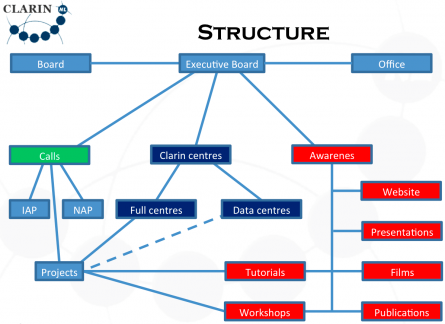Governance
CLARIN-NL has a mixed character: partially it is a project that requires efficient assignment and execution of a variety of tasks; partially it is more like a programme in which projects can be submitted to open calls and calls for tender.
The organizational structure will have to take a number of central objectives of the program into account simultaneously:
- to bring together expertise on a range of sub-disciplines in order to address the core issues involved in setting up a research infrastructure for specific strategic research questions;
- to assure the coherence of the overall activities program in terms of the conceptual issues at the core of the program;
- to develop and apply new data sources;
- to assure high quality both of the overall program and of the individual projects;
- to keep to the schedule proposed in the planning;
- to stimulate communication among the researchers working in the programme
The CLARIN-NL organizational structure consists of the following bodies:
Board
Consists of senior researchers and other experts with expertise in the field and in governance
- Max. 10 members
- Typically meets twice a year
- takes strategic decisions
- is responsible to Funding Agencies
- determines the Annual Report
- determines the Financial report
- determines the Long Term Work Plan
- determines the Yearly Work plan
- decides on appointing members in the governance bodies
- monitors progress of the project as a whole
- acts as mediator in case of conflicts
- assigns, if needed, new tasks to governance bodies
- determines the procedure for avoiding conflict of interest
- decides on admission of new participants
- Programme Director and CLARIN European coordinator attend the Board meetings as informant/observer
Executive Board (EB)
- 4 members
- Frequent meetings (once every two weeks) and other contacts
- The executive board reports to the Board
- The EB is chaired by the programme director (Prof.dr. J. Odijk), who has the full and final responsibility for the CLARIN-NL project reaching its goals and the effective functioning of its infrastructure. He will be in charge of the daily coordination of activities, implementation of evaluation procedures, finances, and personnel. The programme director will have regular contacts with Board, NAP and IAP.
- The other members have specific subtasks, e.g. technical coordination, dissemination, education, awareness, IPR, etc., as their assignment.
- The EB prepares the long term work plan including success criteria for evaluating the project
- The EB translates the long term programme into yearly work plans
- The EB monitors the progress of assigned sub projects
- The EB organizes evaluations of the project
- The EB develops a procedure for avoiding conflicts of interest
National Advisory Panel (NAP)
- 15-20 representatives from Linguistics and Humanities
- The representation of intended users of the infrastructure should be dominant
- Typically meets 5x per year
- Advises on a yearly work plan specifying steps to be taken with respect to the technical (prototype) infrastructure, the data infrastructure, the language technology service infrastructure, establishing user needs, creation and operation of centres of expertise; creation and operation of dissemination, education and awareness facilities
- Evaluates and ranks subproject proposals from calls for project proposals especially taken into account the research environment in the Netherlands.
- Monitors progress of the yearly work plan
International Advisory Panel (IAP)
- Appr. 8 members
- Typically meets once a year
- The IAP is a body of prominent and experienced researchers outside the Netherlands who are actively involved in the creation or maintenance of research infrastructures in e-Linguistics/e-Humanities, more specifically experts in CLARIN, experts in linguistics, experts in the humanities minus linguistics, experts in technical infrastructures and experts in IPR matters.
- Advises the executive board and the board in international matters, e.g. cooperation, coordination and harmonisations with other international initiatives and programmes
- Evaluates and ranks subproject proposals on request of the board resulting in an advice to the board
The initial composition of these bodies is determined by the CLARIN-NL preparatory committee.
All members of these bodies are member "in personae" i.e. they do not act as representatives of their organizations, cannot be replaced by colleagues, and will stay member if they would leave their organization.
CLARIN-NL has a number of participating (research) organizations as its institutional members. Only participating organizations are eligible for funding of activities or subprojects. The list of initial CLARIN-NL participating research organizations has been provided in Appendix C. CLARIN-NL is open for new institutional participants. The Board decides on admission of new participants.

